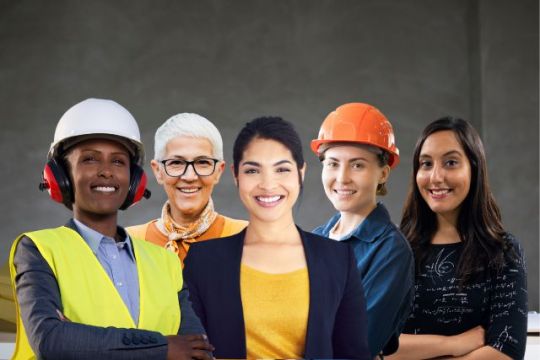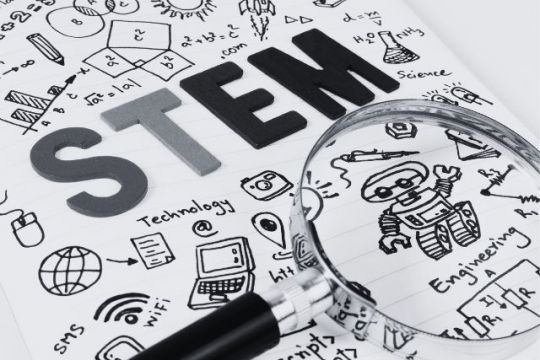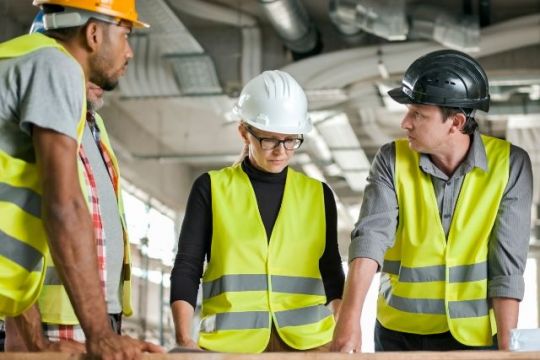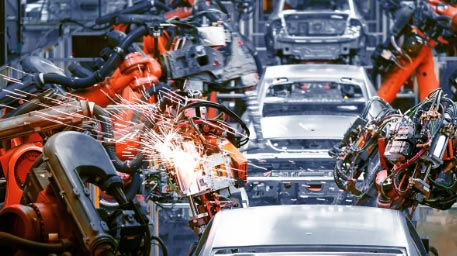
Engineering employs 6.1 million people in the UK, (equivalent to 19% of all jobs), with women making up 48% of the workforce. However, women's representation in engineering and technology remains significantly lower, at just 16.5%.
Breaking down stereotypes and promoting STEM education from an early age is starting to show results. Despite this, there's still a notable disparity in the number of females (and males) pursuing STEM education post-GCSE. A 2023 EngineeringUK report highlighted that only 18% of undergraduate students in engineering and technology are female, compared to 57% across all degree subjects.
Schools, parents, and media can play a significant role in shaping girls' perceptions of engineering as a viable and exciting career path. Mentorship programmes, showcasing successful female engineers, and providing hands-on experiences in engineering can help ignite interest.
Furthermore, universities and employers must create supportive and inclusive environments. Offering scholarships, grants, and targeted support for women in engineering programmes can help bridge the gender gap. In the workplace, companies should implement policies that promote work-life balance, provide opportunities for career advancement, and actively work to eliminate biases.
Following on from International Women in Engineering Day, we reached out to two successful female engineers that Millbank placed early on in their careers. They shared their journeys, challenges, and triumphs. Their responses to our questions were insightful and inspiring.
Meet the Engineers
Arpana (AF) is an accomplished Engineer with a strong foundation in science and a pragmatic approach to problem-solving. Her career spans various projects, focusing on safety and design integrity. Arpana’s role involves validating safety review responses, vetting design reports, and creating operator procedures. She stays updated with industry advancements through online journals and professional networks. Known for her resilience and professionalism, Arpana is passionate about encouraging young women to pursue engineering and advocates for a supportive and diverse work environment.
Georgette (GP) is a dedicated Programme Manager with a passion for aviation and technology. She began her engineering journey at 13 through the Air Training Corps, where she developed a deep love for aeroplanes and a knack for fixing things. In her current role, she leads multiple projects and manages a team of project managers. Georgette is actively involved in STEM activities as a STEM Ambassador, provides peer-to-peer support, and mentors younger colleagues. Her commitment to continuous learning and effective communication has been instrumental in her successful engineering career.
The Questions
What inspired you to pursue a career in engineering?
AF: I have always been interested in and had an aptitude for science-based subjects therefore Engineering felt like a natural fit.
The career is not desk bound and is varied in the type of work I do. Plus from a practical point of view, qualifications in Engineering opens opportunities in various industries and locations and even careers not related to engineering.
Engineering offers careers that are more financially rewarding with good job security.
GP: I joined the ATC (Air Training Corps) when I was 13 as a youth volunteer and fell in love with aeroplanes and everything to do with them. I also enjoyed taking things apart and fixing them.

Can you describe your current role and a typical day and your favourite aspect of the job?
AF: I am currently involved in several projects / tasks that are running concurrently.
I am validating action responses from safety reviews to make sure that the design intent is being realised safely. This allows me to talk to various people about how they are progressing and offer support, if needed, in providing appropriate responses.
Up until recently I was vetting the design reports (calculations, specification, drawings, safety assessments) for several small projects making sure the objectives were being met, then visiting site to make sure construction was progressing in accordance with the design requirements. I also composed procedures for operators to follow in the event of deviations from normal operations.
I love dealing with different aspects of engineering (e.g. design, safety, problem solving, construction, commissioning) and working with different groups of people (e.g. maintenance, control systems, safety, commercial).
There is (almost) nothing better than being able to design, build, “plug it in” and “switch it on” and watch it work how you intended.
GP: As a Programme Manager, I lead five projects and oversee five project managers.
My day involves project reviews, handling escalations, and supporting my team.
I also engage in STEM activities as a STEM Ambassador, I’m a Peer to Peer support volunteer which is like a mental first aider, and I mentor some of my younger colleagues and graduates who have joined the business.
The best part of my job is meeting new people and learning about new technologies.

What skills are essential for a successful engineering career and how do you stay updated with the latest trends and advancements?
AF: I believe that a pragmatic approach to problem solving and the ability to communicate with people at all levels and backgrounds within an organisation are essential. These skills will give you the ability to work collaboratively and facilitate your objectives in finding the best approach to any task that you are set. Simply put, if you are ‘nice’ and demonstrate a level of competence (without any hint of arrogance) more people will help you and want you to succeed. Never be afraid to ask for help.
Communication is key, the ability to present information that is appropriate for the audience, unambiguous and clear (no one wants to trawl through pages of verbiage to find out how big the pump needs to be).
There are a number of on-line journals that I access as well as LinkedIn posts and the Institute of Chemical Engineering. These keep me up to date with advancements as well as political decisions that may have an impact on my career and anything else within engineering.
GP: Always having a curious mind, enjoy learning new technology and willing to speak to everyone no matter what level they are at.
I learnt so much from the machine operators and shopfloor staff on how their machines work and what goes wrong when they break down.
Every opportunity needs to be an opportunity to learn.
I stay informed through LinkedIn and various online resources.

What advice would you give to young women considering a career in engineering?
AF: Approach this career, as you would any, with professionalism and resilience. Stand up for what you believe in and work with integrity, courage and conviction.
This is an exciting time for engineering and manufacturing with huge potential due to the work being done, particularly within the Energy and Environment sectors.
GP: Have a growth mindset and don’t be afraid to make mistakes. Treat any interview as a two way process. You need to interview the company, interviewing you too! Managers can make or break you, choose well.
Another bit of advice; When you feel you have learnt all you can, or respect is no longer being served move on.
What is the biggest misconception about women in engineering?
AF: Misconceptions are fading, but some still think men don’t know how to interact with female colleagues. Thankfully, such biases are decreasing. I like to believe that we are a lot more enlightened now and I feel that the misconceptions about women in engineering or any professional role have been dispelled.
There may be a fear that the male co-workers don’t know how to interact with female colleagues, so helping them understand that we are not so different is useful. Thankfully it is now no longer automatically assumed that as a woman you must be a ‘secretary’.
There will always be individuals who harbour prejudices against women, but it is better to rise above them and prove them wrong.
GP: There’s a misconception that women aren’t interested in technology or lack the skills for tech jobs.
These are far from the truth.

How do you handle working in a predominantly male environment?
AF: Professionalism and finding common ground, like sports, help in building rapport. The workplace dynamics are changing with more women joining the field.
Again approach everything and everyone professionally. My values, especially regarding language use, have sometimes been challenged (I dislike hearing expletives at work). I try to understand if someone is being intentionally offensive and, if needed, ask a peer to address the issue discreetly before escalating.
As a fresh graduate at a manufacturing site, I found that brushing up on general sports knowledge was a great conversation starter. It helped me build rapport with colleagues and foster a team bond.
The work environment has significantly improved since the early 90s. 'Girly' calendars and crude behavior are no longer tolerated, and being asked why I'm not at home making tea is rare now. With more women in the workplace, there is strength in numbers. I also make a point of connecting with other women, especially younger ones, to help ensure that we are all there to support each other.
GP: I think unfortunately you must prove that you are just as good, if not better sometimes.
You need to be able to play to your strengths, I find that there are skillsets that I have, that a lot of my male colleagues don’t have.
Soft skills and emotional intelligence go a long way.

What initiatives should companies take to encourage more women to enter engineering?
AF: In a world of equal opportunities, the following would be true of any minority group: Promotion of women in prominent roles, adequate provision of facilities specifically for women (so you don’t have to walk half a mile around the block to get to the only ladies’ loo/changing rooms). Diversity training without making predominant groups feel threatened. Proactively approach and advertise engineering careers to women/girls in schools and colleges.
It is a stereotype that is being broken but as a large proportion of parenting burden still falls upon women (the triple job scenario: office work/housework/family (homework, emotional support, birthdays etc) provision of flexible working arrangements. I know that providing AWA is a legal requirement but not all companies make it a priority.
GP: I think Companies need to make the engineering environment more diverse and have more provisions in place for female colleagues to feel safe to make mistakes without harsh judgment.
They also need to support initiatives that will allow flexible working to support family life.

What has been your most rewarding experience as an engineer?
AF: Apart from being the responsible engineer for the design, construction and commissioning of many projects, my most rewarding experiences have been when younger engineers have come back to me 10-15 years later and said how my approach has helped them succeed in becoming a competent engineer.
GP: Being able to travel and work in foreign countries is so rewarding, as well as working on some brilliant projects and again meeting people from different cultures is such an experience!
In conclusion
These insights from these brilliant women highlight the importance of curiosity, resilience, effective communication, and a supportive work environment. As we celebrate International Women in Engineering Day, we hope that Georgette and Arpana’s journeys inspire more women to explore and excel in engineering, contributing to a diverse and innovative future.
If you would like to enter the engineering world, let us help you with your career.





